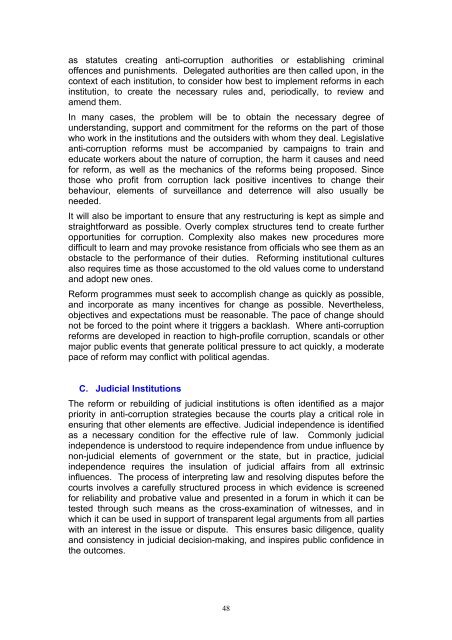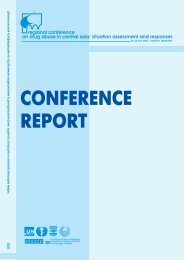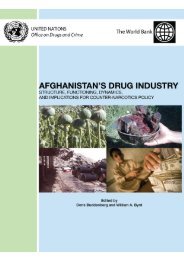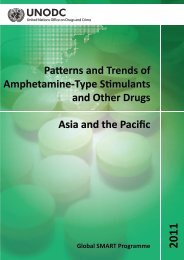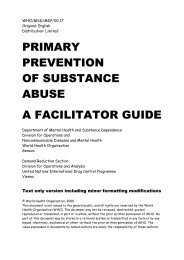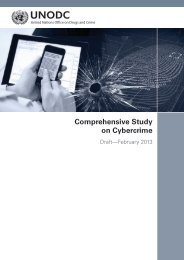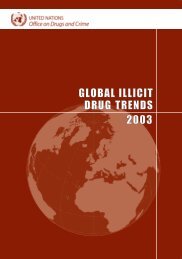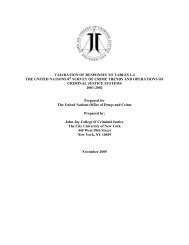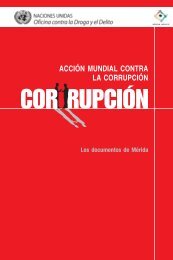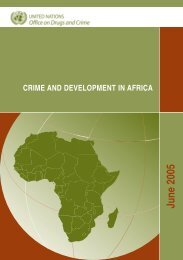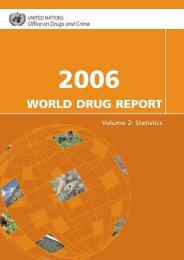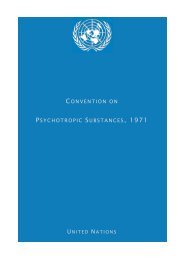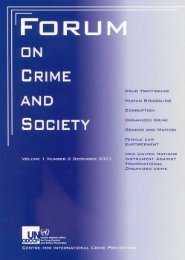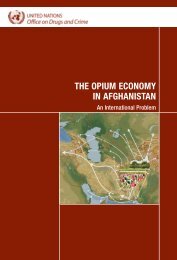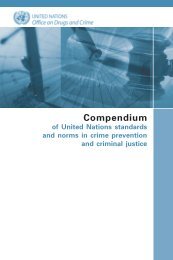UN Guide for Anti-Corruption Policies - United Nations Office on ...
UN Guide for Anti-Corruption Policies - United Nations Office on ...
UN Guide for Anti-Corruption Policies - United Nations Office on ...
Create successful ePaper yourself
Turn your PDF publications into a flip-book with our unique Google optimized e-Paper software.
as statutes creating anti-corrupti<strong>on</strong> authorities or establishing criminal<br />
offences and punishments. Delegated authorities are then called up<strong>on</strong>, in the<br />
c<strong>on</strong>text of each instituti<strong>on</strong>, to c<strong>on</strong>sider how best to implement re<str<strong>on</strong>g>for</str<strong>on</strong>g>ms in each<br />
instituti<strong>on</strong>, to create the necessary rules and, periodically, to review and<br />
amend them.<br />
In many cases, the problem will be to obtain the necessary degree of<br />
understanding, support and commitment <str<strong>on</strong>g>for</str<strong>on</strong>g> the re<str<strong>on</strong>g>for</str<strong>on</strong>g>ms <strong>on</strong> the part of those<br />
who work in the instituti<strong>on</strong>s and the outsiders with whom they deal. Legislative<br />
anti-corrupti<strong>on</strong> re<str<strong>on</strong>g>for</str<strong>on</strong>g>ms must be accompanied by campaigns to train and<br />
educate workers about the nature of corrupti<strong>on</strong>, the harm it causes and need<br />
<str<strong>on</strong>g>for</str<strong>on</strong>g> re<str<strong>on</strong>g>for</str<strong>on</strong>g>m, as well as the mechanics of the re<str<strong>on</strong>g>for</str<strong>on</strong>g>ms being proposed. Since<br />
those who profit from corrupti<strong>on</strong> lack positive incentives to change their<br />
behaviour, elements of surveillance and deterrence will also usually be<br />
needed.<br />
It will also be important to ensure that any restructuring is kept as simple and<br />
straight<str<strong>on</strong>g>for</str<strong>on</strong>g>ward as possible. Overly complex structures tend to create further<br />
opportunities <str<strong>on</strong>g>for</str<strong>on</strong>g> corrupti<strong>on</strong>. Complexity also makes new procedures more<br />
difficult to learn and may provoke resistance from officials who see them as an<br />
obstacle to the per<str<strong>on</strong>g>for</str<strong>on</strong>g>mance of their duties. Re<str<strong>on</strong>g>for</str<strong>on</strong>g>ming instituti<strong>on</strong>al cultures<br />
also requires time as those accustomed to the old values come to understand<br />
and adopt new <strong>on</strong>es.<br />
Re<str<strong>on</strong>g>for</str<strong>on</strong>g>m programmes must seek to accomplish change as quickly as possible,<br />
and incorporate as many incentives <str<strong>on</strong>g>for</str<strong>on</strong>g> change as possible. Nevertheless,<br />
objectives and expectati<strong>on</strong>s must be reas<strong>on</strong>able. The pace of change should<br />
not be <str<strong>on</strong>g>for</str<strong>on</strong>g>ced to the point where it triggers a backlash. Where anti-corrupti<strong>on</strong><br />
re<str<strong>on</strong>g>for</str<strong>on</strong>g>ms are developed in reacti<strong>on</strong> to high-profile corrupti<strong>on</strong>, scandals or other<br />
major public events that generate political pressure to act quickly, a moderate<br />
pace of re<str<strong>on</strong>g>for</str<strong>on</strong>g>m may c<strong>on</strong>flict with political agendas.<br />
C. Judicial Instituti<strong>on</strong>s<br />
The re<str<strong>on</strong>g>for</str<strong>on</strong>g>m or rebuilding of judicial instituti<strong>on</strong>s is often identified as a major<br />
priority in anti-corrupti<strong>on</strong> strategies because the courts play a critical role in<br />
ensuring that other elements are effective. Judicial independence is identified<br />
as a necessary c<strong>on</strong>diti<strong>on</strong> <str<strong>on</strong>g>for</str<strong>on</strong>g> the effective rule of law. Comm<strong>on</strong>ly judicial<br />
independence is understood to require independence from undue influence by<br />
n<strong>on</strong>-judicial elements of government or the state, but in practice, judicial<br />
independence requires the insulati<strong>on</strong> of judicial affairs from all extrinsic<br />
influences. The process of interpreting law and resolving disputes be<str<strong>on</strong>g>for</str<strong>on</strong>g>e the<br />
courts involves a carefully structured process in which evidence is screened<br />
<str<strong>on</strong>g>for</str<strong>on</strong>g> reliability and probative value and presented in a <str<strong>on</strong>g>for</str<strong>on</strong>g>um in which it can be<br />
tested through such means as the cross-examinati<strong>on</strong> of witnesses, and in<br />
which it can be used in support of transparent legal arguments from all parties<br />
with an interest in the issue or dispute. This ensures basic diligence, quality<br />
and c<strong>on</strong>sistency in judicial decisi<strong>on</strong>-making, and inspires public c<strong>on</strong>fidence in<br />
the outcomes.<br />
48


